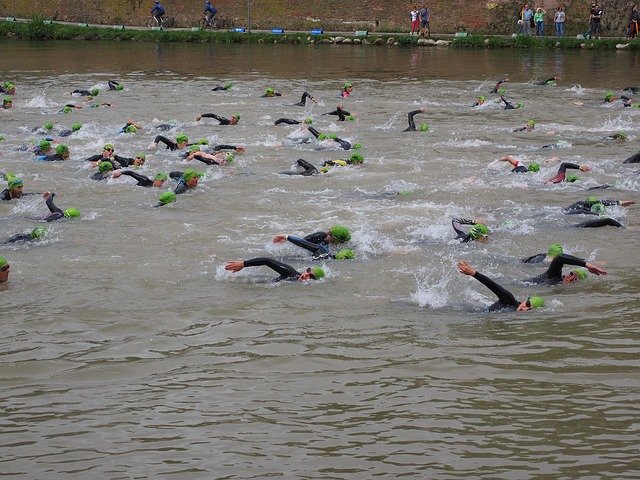On the whole, swimming this distance mostly depends on each person, and more specifically on how long they have been swimming, their workouts and routes, their stamina and general physical condition, and their swimming technique. Age is also a factor to take into account. Typically, it should take beginners from around 40 to 50 minutes, whereas intermediate swimmers will hardly take 30 to 35 minutes and higher swimmers about 25 minutes or less.
Many competitive swimmers are capable of swimming under 20 minutes if they put in some effort and push through the early ache once their muscles start stinging.
Swimmers who have been working out at the local circuit pool for a considerable period of time and have developed some good fitness condition for themselves and become proficient at decent freestyle swimming performance should be marking for about 25 minutes or just higher than that, at the same time as less qualified swimmers could almost certainly swim a mile in 35 to 40 minutes or a little more.

Full amateurs can take up to an hour to swim a sole mile since they will most likely require to pause to rest here and there to go forward without exhausting.
Many swimmers need to keep in mind that they have to be patient with themselves and their level of training, or else they will never improve and could end up hurting themselves.
For swimming faster, one can always perfect their long-distance swimming technique.
All of that said, we now know that swimming a mile depends highly on each individual’s circumstances and physical shape, and also in a different setting. According to the following estimations, the timespans are the following:
| A mile in the pool | 25 to 27 minutes |
| A mile in open water | 30 to 32 minutes |
| A mile in the ocean | 33 to 35 minutes |
It was predictable that the time for the same distance would vary in the different environments, especially from a pool to the open ocean; we have already discussed how everything we do in a pool becomes more challenging the moment we dip in open water and requires more time and energy from our part.

The recorded data from the most famous swimming events stated that it took that swimmers the standard 30 minutes and 0.02 seconds to swim a mile. Rounded down, it makes an average of 30 minutes. For a fairly decent swimmer, this would be a good number to goal for when swimming a mile.
The fastest times for the mile swim have been recorded to be about 19 minutes. While the slowest times were around 50 minutes.
As with a pool, usually, it should take approximately 25 to 27 minutes to swim a mile. This is a good time to seek and most swimmers with decent swimming techniques and turns will be able to swim that time by putting in a bit of effort.
A comfortable way to swim long distances faster is to use a tech suit or wetsuit to improve your swimming performance.
How Long Does it Take to Swim a Mile in the Ocean?
This is a tricky one since other factors can disturb your times such as tides dragging you towards certain directions, waves, alterations in water temperature, and more.
It should take the regular swimmer about 35 minutes to finish a mile swim in the ocean. This time possibly will be to some extent higher or lower varying on wave force and whether or not there are flows in the water on the day of your swim.

Conclusion
To some, swimming a mile represents more than a challenge. To others, it’s one of the easiest tasks in the world. It all depends on your swimming experience level, your swim technique, and your overall fitness and conditioning. You don’t have to compare yourself to others and their achievements to move forward in your training and surpass your limits, especially if you’re still a beginner.
Remember, overworking yourself and pushing yourself to limits that you can’t yet reach is dangerous and discouraging, it could cause you an injury or a bad mentality for the rest of your swimming career. The desire to win is important for competitors, but so is the desire to do one’s best, which won’t happen if you deteriorate instead of improving yourself by pushing yourself to do things you’re not yet capable of doing.
At the end of the day, all the swimming experience should come down to testing yourself to impulse your limits and swimming the best time you can. Keep doing your best and – most importantly – stay constant in your training, so you can achieve all the distances that you have set for a swimming career.
